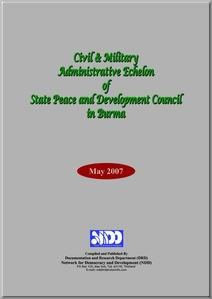Myanmar's rice-growing heartland has been devastated by Cyclone Nargis, posing worries of long-term food shortages for the impoverished country and political problems for its military regime, experts said Wednesday.
The Rome-based U.N. Food and Agriculture Organization estimates that five states hit hardest by Saturday's cyclone produce 65 percent of the Southeast Asian country's rice. The region also is home to 80 percent of its aquaculture, 50 percent of its poultry and 40 percent of its pork production, the FAO said.
Since Myanmar -- also known as Burma -- has produced enough rice to feed itself until now, it has managed to avert potentially dangerous shortages as well as rice price increases, which have tripled recently on the global market.
"There is likely going to be incredible shortages in the next 18 to 24 months," said Sean Turnell, an economist specializing in Myanmar at Australia's Macquarie University. "Things will be tough."
Once the world's top rice producers, Myanmar has in the past four decades seen its rice exports drop from nearly 4 million tons to only about 40,000 tons last year.
Myanmar's exports are so small these days that few expect the cyclone will have any impact on world rice prices, because its own people consume most of the rice it produces.
"I don't think the cyclone in (Myanmar) is sufficient to spark another bout of hoarding and panic buying by consumers around the world that was the cause of the recent spike in prices," said Frederic Neumann, an economist at HSBC Global Research in Hong Kong, adding he felt the prices would continue falling.
Irrigation canals and rice storage Relevant Products/Services facilities have fallen into disrepair, mostly due to mismanagement by Myanmar's ruling generals. Fertilizer and credit for farmers are almost nonexistent.
The U.N. World Food Program said there are concerns about salvaging harvested rice in the flooded Irrawaddy delta, known as the country's rice bowl.
It also warned that the rice harvest in the Bago district could be lost since it was still in the ground, and that future plantings in the delta could be threatened due to "salinity and decrease of nutrients" from the storm's tidal surges.
"Over the next three to six months, there will likely be a need for family food rations in this region," said WFP spokesman Paul Risley. "Families lost their homes and lost what private food stocks they had."
The cyclone, which battered the country last weekend with winds of 120 mph and nearly 12-foot storm water surges, caused at least 22,000 deaths and more than 41,000 people are missing.
(Source-http://www.sci-tech-today.com/story.xhtml?story_id=59660)
Thursday, May 8, 2008
Cyclone Has Devastated Myanmar's Rice Region
Subscribe to:
Post Comments (Atom)



















No comments:
Post a Comment